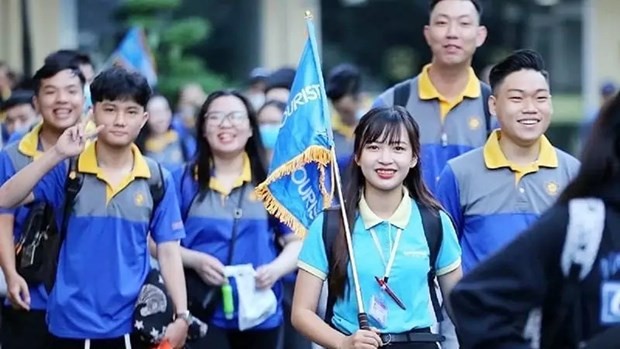
Human resources still remain a challenge for tourism industry
Latest
 |
| Students of the Saigontourist Hospitality College. (Source: Courtesy of the college) |
Vietnam’s human resources for tourism are still insufficient both in number and quality, posing a great challenge for the industry in the context of tough competition and deeper international integration.
The country has 195 tourism training establishments including 65 universities, 55 colleges, 71 vocational schools, four job training centres and two establishments run by enterprises. All of them can provide about 20,000 tourism workers yearly while Vietnam’s tourism sector requires 40,000, according to the Vietnam National Authority of Tourism (VNAT).
Moreover, among the tourism workforce, only 43% received professional training in tourism, and just 9.7% hold university and postgraduate degrees.
A report by the Tourism Development Research Institute shows that the quality and labour productivity in Vietnam's tourism industry are still low. For example, labour productivity at hotels in Vietnam is only one-fifteenth compared to Singapore, one-tenth compared to Japan and one-fifth compared to Malaysia. As such, Vietnamese tourism workers have to face tough competition right on home ground.
Speaking at the workshop "Training and Utilising International Standard Tourism Human Resources in the Current Period" held in Hanoi recently, Dao Manh Hung – Chairman of Vietnam Tourism Education Association said that as the ASEAN Mutual Recognition Arrangement on Tourism Professionals (MRA-TP) allows the movement of skilled tourism workers in the bloc, foreign tourism workers may rush to Vietnam, posing employment threats to local workers.
A lot of tourism workers from countries like the Philippines, Thailand, Indonesia, and Singapore have come to Vietnam to work, and most 4- and 5-star hotels in Vietnam are employing foreign workers.
With the strong recovery of tourism after the COVID-19 pandemic, many travel businesses have resumed operation and more and more upscale accommodation establishments are opening, making the shortage of skilled tourism human resources more severe.
Hung said that state management agencies need to quickly standardise and launch a common training programme for tourism following regional and international standards, with interconnectivity between training levels as well as between domestic and regional/international training institutions.
Dr Doan Manh Cuong from the National Assembly’s Office said that the EU-funded Environmentally and Socially Responsible Tourism Capacity Development Programme has amended the Vietnam Tourism Occupational Skills Standards (VTOS) to align it with Vietnamese regulations and international standards and ASEAN standards.
Therefore, tourism training institutions need to apply the VTOS in teaching to improve the effectiveness of tourism vocational training in Vietnam, Cuong said, adding that training time at enterprises should not be less than 50% of the total duration of the training programme.
























